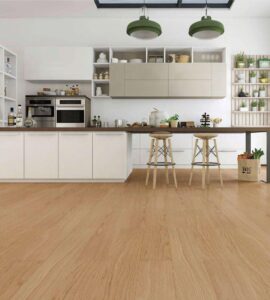
Are you torn between choosing SPC flooring or vinyl plank for your space?
I believe SPC flooring is better than vinyl plank due to its durability1 and water resistance2, but both have unique benefits to consider.
Let me share my insights to help you make an informed decision.3
[Table of Contents]
- Which Is Better, SPC or Vinyl Flooring?
- What Is the Weakness of SPC Flooring?
- What Is Better, SPC Flooring or Laminate?
- What Is the Difference Between Composite and Vinyl Flooring?
- What Is the Disadvantage of Vinyl Flooring?
- Is Vinyl Better Than Composite?
- Conclusion
Which Is Better, SPC or Vinyl Flooring?
I wondered which flooring option offers more value: SPC or traditional vinyl.
In my experience, SPC flooring is superior because it’s more durable and stable, while vinyl flooring is softer and may suit different needs.
Let’s delve deeper into their differences.
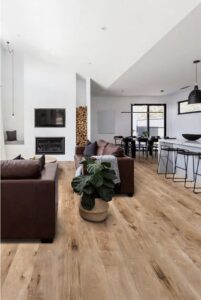
Material Composition
SPC Flooring
SPC stands for Stone Plastic Composite. It combines limestone powder with PVC to create a rigid core that’s highly durable.
Vinyl Flooring
Traditional vinyl flooring is made entirely of PVC, making it flexible and softer underfoot.
Durability and Stability
SPC flooring is more resistant to impacts and doesn’t expand or contract much with temperature changes. I found it ideal for areas with heavy foot traffic.
Water Resistance
Both options are waterproof, but SPC’s rigid core provides enhanced protection against water damage.
Comfort and Sound
Vinyl flooring is softer, offering more comfort when standing for long periods. It also absorbs sound better.
Cost Comparison
| Feature | SPC Flooring | Vinyl Flooring |
|---|---|---|
| Durability | High | Moderate |
| Comfort | Moderate | High |
| Price Range | $$ | $ |
By comparing these factors, I concluded that SPC flooring offers better long-term value.
What Is the Weakness of SPC Flooring?
I wanted to understand the potential drawbacks of SPC flooring.
The main weakness of SPC flooring is its rigidity, which can make it less comfortable underfoot and slightly more challenging to install over uneven surfaces.
Here’s a closer look.
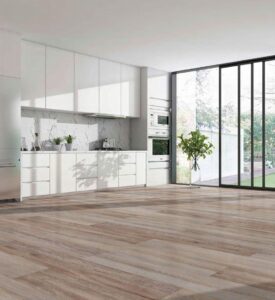
Comfort Level
SPC’s rigid core means it feels harder underfoot. In spaces where people stand for extended periods, this might be uncomfortable.
Installation Challenges
SPC flooring requires a level subfloor. I learned that installing it over uneven surfaces can lead to issues like clicking noises or separation.
Limited Design Flexibility
While SPC offers various designs, it might not match the extensive variety found in traditional vinyl flooring.
Environmental Impact
SPC flooring is not biodegradable, which may be a concern for environmentally conscious consumers.
What Is Better, SPC Flooring or Laminate?
I compared SPC flooring with laminate to see which one meets different needs better.
I found that SPC flooring is better in terms of water resistance and durability, while laminate flooring might offer a more authentic wood feel at a lower cost.
Let’s explore this further.
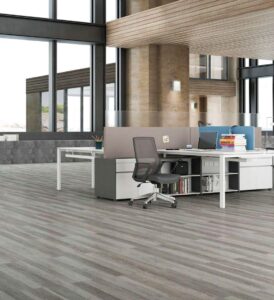
Water Resistance
SPC Flooring
Completely waterproof, making it suitable for kitchens, bathrooms, and basements.
Laminate Flooring
Typically water-resistant but not waterproof. Prolonged exposure to moisture can cause damage.
Durability
SPC flooring resists scratches and dents better than laminate. I noticed that laminate can show wear over time, especially in high-traffic areas.
Aesthetic Appeal
Laminate flooring often mimics the look of real wood more convincingly due to its textured surface.
Cost Considerations
Laminate is generally less expensive upfront, but SPC may offer better long-term value due to its longevity and low maintenance.
| Feature | SPC Flooring | Laminate Flooring |
|---|---|---|
| Water Resistance | Excellent | Moderate |
| Durability | High | Moderate |
| Authentic Look | Good | Excellent |
| Cost | $$ | $ |
What Is the Difference Between Composite and Vinyl Flooring?
I aimed to clarify the differences between composite flooring like SPC and traditional vinyl flooring.
Composite flooring like SPC is rigid and more durable, while vinyl flooring is flexible and offers greater comfort underfoot.
Here’s a deeper dive.
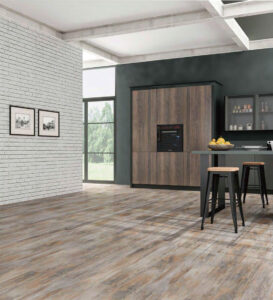
Structural Composition
Composite Flooring (SPC)
- Core Layer: Rigid stone-plastic composite.
- Durability: High resistance to impacts and wear.
Vinyl Flooring
- Core Layer: Flexible PVC.
- Comfort: Softer and more cushioning underfoot.
Installation Methods
- SPC Flooring: Typically installed as a floating floor with click-lock edges.
- Vinyl Flooring: Can be glued down or installed as a floating floor.
Performance Differences
- Temperature Stability: SPC flooring performs better in fluctuating temperatures.
- Acoustic Properties: Vinyl flooring absorbs sound more effectively.
What Is the Disadvantage of Vinyl Flooring?
I explored the potential downsides of choosing vinyl flooring.
Vinyl flooring’s disadvantages include lower durability compared to composites, susceptibility to dents, and environmental concerns related to PVC.
Let’s examine these points.
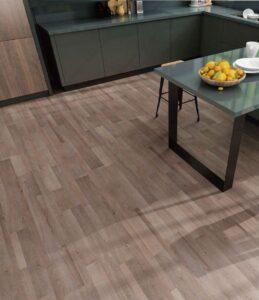
Durability Issues
Vinyl flooring can be prone to scratches and dents from heavy furniture or sharp objects.
Environmental Impact
Production of PVC involves chemicals that may be harmful to the environment. Disposal can also pose ecological challenges.
Fading and Discoloration
Prolonged exposure to sunlight can cause vinyl flooring to fade or discolor over time.
Subfloor Imperfections
Vinyl’s flexibility means it can conform to subfloor imperfections, which may be visible on the surface.
Is Vinyl Better Than Composite?
I considered whether vinyl flooring might be a better choice than composite options like SPC.
In my opinion, composite flooring like SPC is generally better due to its superior durability and stability, but vinyl flooring may be preferable for those prioritizing comfort and cost.
Here’s why.
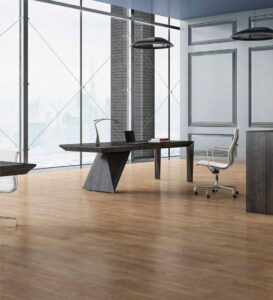
Advantages of Vinyl Flooring
- Comfort: Softer feel underfoot, making it comfortable to walk on.
- Affordability: Generally less expensive than composite flooring.
- Ease of Installation: Flexible and easier to cut and fit into irregular spaces.
Advantages of Composite Flooring (SPC)
- Durability: More resistant to wear and tear.
- Waterproof: Better suited for areas prone to moisture.
- Stability: Less expansion and contraction with temperature changes.
Decision Factors
Your choice depends on your specific needs:
- Budget Constraints: Vinyl might be more suitable.
- Long-Term Value: SPC offers better durability.
- Comfort Needs: Vinyl provides a softer surface.
Conclusion
Choosing between SPC flooring and vinyl plank depends on your priorities for durability, comfort, and budget. Consider the pros and cons to select the option that best fits your needs.
-
Why Readers Should Click: The linked resource explores why SPC flooring is considered highly durable due to its rigid core and resistance to wear and tear. Readers will gain clarity on how SPC flooring outperforms vinyl plank in terms of lifespan. ↩
-
The article explains the advanced waterproof properties of SPC flooring, making it ideal for areas like kitchens, bathrooms, and basements. This helps readers understand its practical advantages over vinyl plank flooring. ↩
-
This comprehensive comparison highlights the pros and cons of SPC flooring and vinyl plank flooring, including installation, cost, and performance. It empowers readers to choose the right option based on their specific needs. ↩


